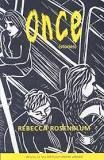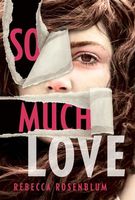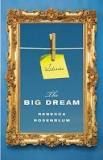Where Are the Classmates Now?
By Koom Kankesan
I met Rebecca Rosenblum in the Advanced Fiction Writing class during my undergrad in Creative Writing - at Concordia University, in Montreal. But Rebecca did not go to Concordia - she went to McGill - (I called the two Discordia and McGall in my workshop writing but that is another story) - she was an interloper in our midst! Every week, Rebecca would come down the hill from McGill, long tresses flowing, and assiduously take part in our class, applying her vast knowledge of literature, gentle positivity, and serious studiousness to our discussions and work. She was easily the best writer in the class. The audacity (!), and she wasn't even in a creative writing program - they didn't have one at McGill which is why she took our class.
Undergrad ended and we went our different ways. We wrote to each other a little (with pens and paper - an ancient technology which required manual application and did not utilize computers). Part of that migration or reverse-migration or trans-migration that made its way from Montreal to Toronto, we ran into each other again - we were both doing our MA's at the same time at U of T. I would see her around. She had gotten into publishing but took herself seriously as a writer, her application and focus keen as ever. Now, she is as hard at work, has two acclaimed books published with Biblioasis, and has recently made the transition to McClelland & Stewart. M & S is publishing her forthcoming book So Much Love. It was a pleasure to catch up with her. A literary rose-in-bloom by any other name is a Rosenblum just the same!
Koom: Congratulations on the publication of So Much Love. Can you talk a little bit about moving from a smaller publisher to a larger one - what were the differences that stood out during the process for you?
Rebecca: Thanks! Strange to say, the move from Biblioasis to McClelland and Stewart wasn’t that much of a shock. Even though M&S is part of the larger Penguin/Random House organization, to a writer—well, to me—they feel and act very much like a little, familyish operation. Anita Chong is my editor for So Much Love, and while her sensibility is very different, she is similar to my first editor, John Metcalf, in her intensity, insight, and generosity. Both editors have a passion for getting it right even if it takes six drafts and even if I initially freak out at the editing suggestion. Both Anita and John were infinitely generous with their time and really lived the experience of editing the books with me, reading and interrogating every word in their written edits, and then calling me to make sure I really understood what they wanted. Editing has been my main experience with M&S so far, so perhaps things will seem less familiar when I hit the marketing/publicity part of the process, but for now, I don't honestly feel like the change has been huge.
Koom: That's great. You and I were in a creative writing class in university (more than fifteen years ago!) and you mentioned to me recently that this book had its origins in one of the pieces you workshopped back then. Can you talk a little about the process of its evolution, or your working on it from back then up till now?
Rebecca: Oh boy, 15 years! Terrifying, but I guess with a happy ending. I started building the world that eventually encompassed the characters in So Much Love in that class with you, in 2000-2001--and the following year came up with the outline of the novel's plot. I worked on it for another two years, and then gave up . I wanted to write it as a very traditional single-perspective novel back then, and I just couldn't do it--didn't have the writing chops, and I don't think the story really lent itself to that format.
Two years later, I won a novel-writing class at George Brown and wrote a really tight first chapter in that class--it is still pretty much the first chapter, though significantly revised--and then wasn't able to do much more, but I kept trying with various fragments and bits that either went nowhere or wound up being standalone short stories that I pulled out and published separately. I enrolled in grad school in the fall of 2005 with the intention of working on the book as my thesis project, but I was more and more captivated by the short story form and wrote a collection of those as my final project instead.
With editing, that collection became my first book, Once, and then I wrote another collection--linked, this time, called The Big Dream--for my second. When I handed that in, early in 2011, I had in mind that stories are my medium, and that perhaps I could finally work with the material that I had thought would be my novel in a collection of linked stories. Which, with a lot of struggle, I did do-- the first complete ms of So Much Love was a spare, elliptical collection that told Catherine and Julianna's stories and a few others, and was about 48 000 words. I finished that in early 2014 and M&S took it on in June. And by midsummer, Anita and I had embarked on editing it into a true novel, though polyphonic, which it really should have been all along, and a much longer, smoother book. That took more than two years, ending in September 2016. And here we are.
Your CanLit News
Subscribe to Open Book’s newsletter to get local book events, literary content, writing tips, and more in your inbox
Though it did, in the end, work out, I do not recommend writing a book this way.
Koom: What an interesting journey! You won't believe this but our class was actually in 1999 -2000, although I can't remember now whether it was one semester or the whole year? Even back then, I could tell that you were a serious writer and devoted to your craft. Has life played out the way you expected in terms of becoming/being a writer? Why or why not? Or how?
Rebecca: Oh gosh, I'm feeling super-old right now. I think it was a year, and you're right, my third year of uni! It was a strange class--so many good people, so much chaos.
I think it was very hard at that point in our lives to look ahead and feel like we knew where the writing road would lead. It's still hard, I find. I never had a plan--I knew I would always keep writing and I kind of hoped people would help me and that eventually I would be able to bring something to an audience and that they'd be interested, but I had no idea what form that would take. So I'm really pleased to be at the point I'm at--some books out, some notice here and there, lots of writing friends and colleagues. But at the same time, I absolutely do not make a living from this and have a whole other professional career that I have to fit the writing around--I didn't expect that I wouldn't necessarily, but it's still hard to explain myself. I definitely feel like I'm doing what I want and becoming a better writer, but is this a career? A vocation? A thing I do sometimes? I don't want to stop and I don't necessarily even want anything to change (well, I'd like more sleep), but it would help to have a name for this sort of working-in-art thing that isn't a hobby but isn't a job. I just want a category to be in, I guess. Do you have a name for it?
Koom: Besides being a hopeful artist? I don't have a name for it. I started out saying I was a half time teacher and half time writer but now I tell people I'm a teacher who writes on the side. My last question for you has to deal with transitioning to a new project. The last time I saw you, you were very much looking forward to that. Can you describe what it's like to wrap up such a long project and begin something new? Do you have a routine or schedule that you follow?
Rebecca: I usually get in immediately with other work, at least to dabble--I'm uncomfortable not having at least a little creative work in my life. This time it's an essay that should have been finished ages ago but the novel edits were much more extensive and time-consuming than expected. The essay is challenging but a good change of tone and style for me right now. In truth I miss my book though. I wanted to be done for a long time--it is a dark book and a hard place to live for six years--but I built my life around it in a way and it is strange not to have anything to fill that space.
Koom: That's a great answer. I guess I know the feeling - I was finishing my five year book at the same time you were. Is that the note you want to end our mini-interview on though? If you'd like to add anything else, feel free.
Rebecca: Oh maybe just that I'm looking forward to reading So Much Love as a reader once I have a little distance. Right now my view is right smack up against it and I can't see anything clearly. But I've been reading some of my old books lately and because I am no longer the person that wrote them I'm able to just be a reader--laugh at the jokes, cringe at the stuff that isn't working. Sometimes I'm really shocked by the stuff I got right--how did I know??? I'd really like to have that experience with So Much Love someday.
The views expressed in the Writer-in-Residence blogs are those held by the authors and do not necessarily reflect the views of Open Book.
Koom Kankesan was born in Sri Lanka. While his family lived abroad, the civil war in Sri Lanka broke out and this caused them to seek a new home. They eventually settled in Canada and have lived here since the late eighties. He has a background in English Literature and Film Studies. Koom contributed arts journalism to various publications before becoming a high school teacher in the Toronto District School Board. Since working as a teacher, he has taken semesters off now and again to work on his fiction. The Tamil Dream, his new book, is his most ambitious to date. It looks at the end of the civil war in Sri Lanka and how it affected Tamils here in Canada. Besides literature and film, Koom has deep interests in history and science, and an enduring love for comic books.
You can write to Koom throughout January at writer@open-book.ca.






